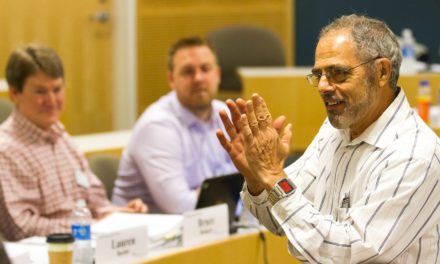Penn State’s 2022-23 men’s hockey team was stacked
with business students preparing for careers on and off the ice.
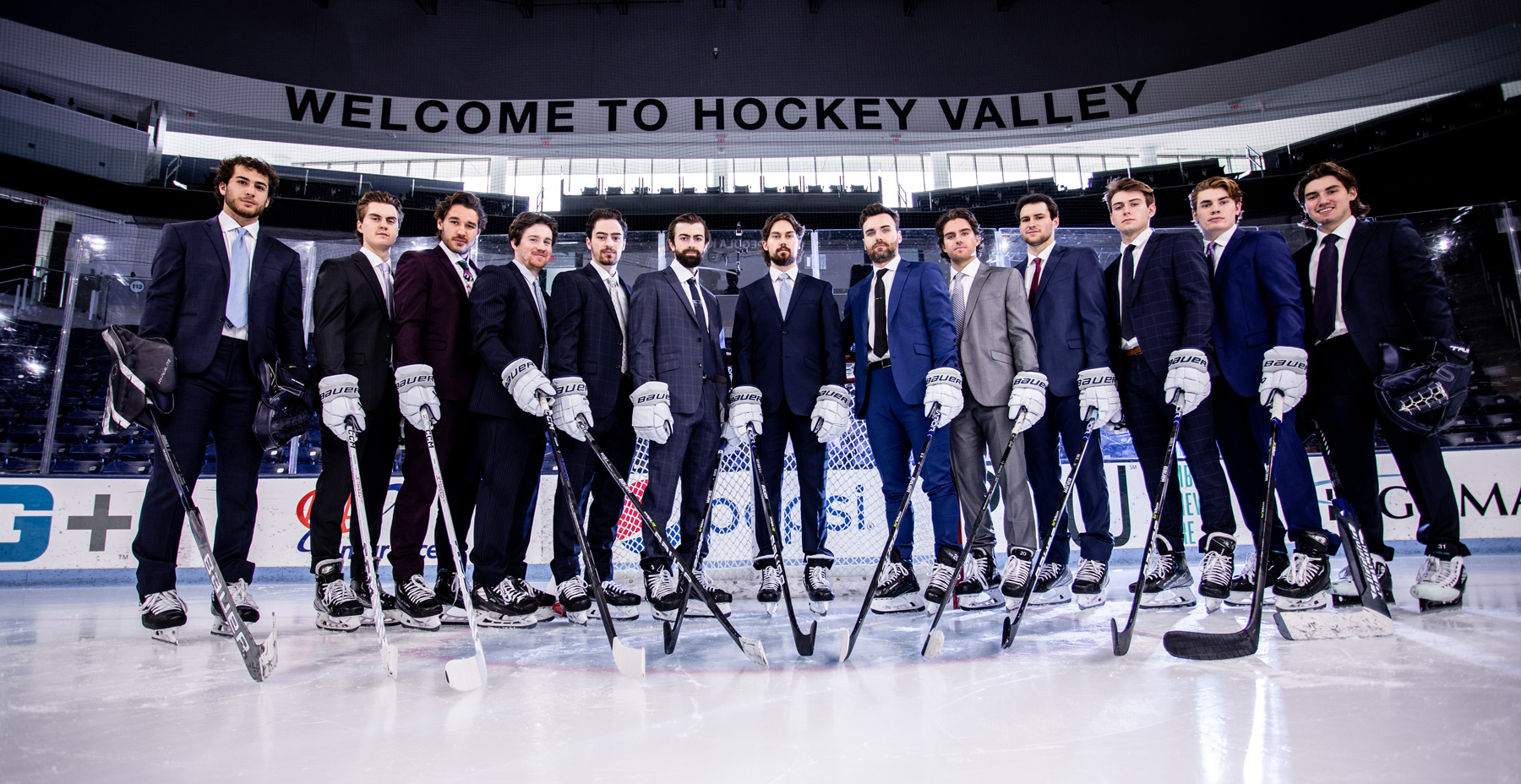
From finance to accounting to marketing, with supply chain and management consulting in between, nearly half of the athletes on Penn State’s men’s hockey team opted to pursue a major within the Smeal College of Business, and all of them are glad they did.
The roster of the team that was one overtime goal short of a trip to the Frozen Four was 27 strong; 13 of them — or 48.8% — balanced the demanding life of a top-tier, Division I collegiate athlete with the rigorous academic requirements of business students.
Penn State head coach Guy Gadowsky points out that his team during the fall 2022 semester had the highest collective GPA among men’s teams within Intercollegiate Athletics. “We are really, really proud of the academic performance of our team,” he says. “And we have one of the best business schools in the world. Guys know it, and they want to take advantage of it.
“That’s why we have so many guys in business. I don’t necessarily think it’s that hockey players gravitate toward that, I just think that there’s a lot of hockey players, a lot of athletes, a lot of students who come to Penn State with the hope of taking advantage of one of the best business schools in the world.”
Ashton Calder earned an undergraduate degree in finance at the University of North Dakota before transferring to play a final season at Penn State. “I wanted to match that up with an MBA and [Penn State Smeal] had the one-year MBA program,” says Calder, a hockey forward from Sault Ste. Marie, Michigan, who has a future interest in wealth management.
“…I just think there’s a lot of hockey players, a lot of athletes, a lot of students who come to Penn State with the hope of taking advantage of one of the best business schools in the world.”
“It’s a lot of work,” he continues. “But they [Smeal] do a really good job of helping us by giving us resources. It’s been awesome. They give us every little thing to help us get through it and help us get there. I think that’s the best part about it; it’s hard work, but they definitely make it possible.”
The players’ schedules are taxing. Calder, for example, awakens at 6:30 a.m., eats breakfast, and attends classes from 8 a.m. to 12:30 p.m. He goes to his second home, Pegula Ice Arena, and works out from 1 to 2:30, skates from 3 to 4:30, has a recovery period and then eats dinner.
“Then I go home, and I have a couple hours usually spent doing homework … I have a lot of homework,” Calder says. “That’s one thing I think is funny, everybody talks about maybe at some other schools you get away with not doing homework if you’re an athlete, but not here; they treat us just like any other student. It’s good, though, it makes us learn it.”
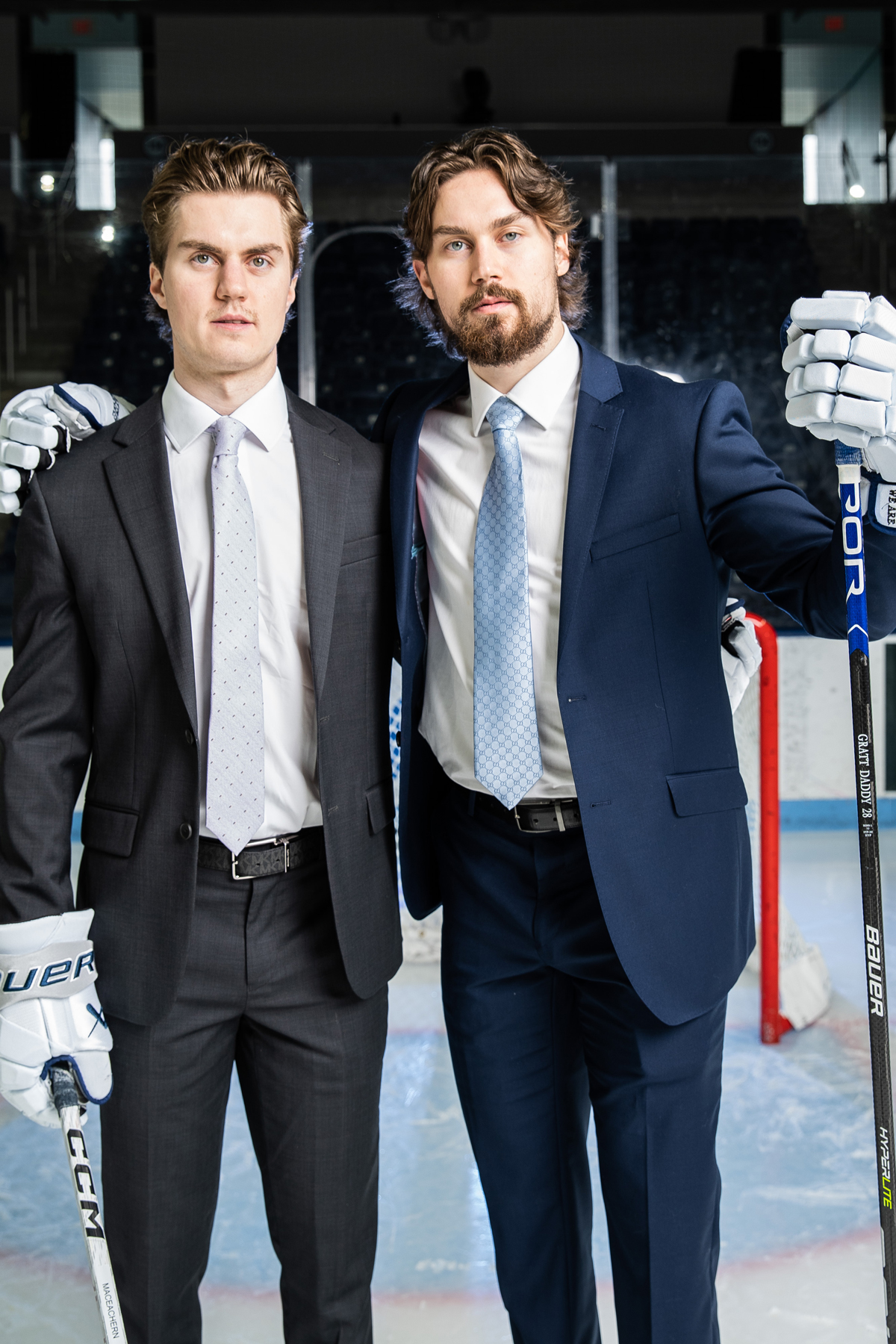
Dylan Gratton (left), a true freshman and defenseman on the 2022-23 team, and his older brother, senior forward and co-captain Tyler Gratton, made an impact on the ice for the Nittany Lions. Both of the Gratton brothers, who hail from Pottstown, Pennsylvania, have set their sights on careers in business.
There is a lot to learn. Smeal majors must complete between 36 and 59 credits for entrance to a major, and required grade-point averages range from 3.1 for corporate innovation and entrepreneurship to 3.2 for accounting to 3.5 for finance, to name a few.
Pre-requisite courses can include calculus, statistics, economics, and accounting, while the corporate innovation and entrepreneurship major requires supply chain, business law, and management information systems.
Christian Berger, a junior defenseman from St. Louis, is a finance major who says the academic-athletic mix of finance and ice hockey Penn State offered was appealing.
“It was just a good thing to know coming in as a freshman that I could get a good education from Smeal and do well in school,” he says. “I’m trying to get a part-time, remote internship this summer to check out some different avenues of finance. I can only do part-time remote because I have to be here training and focusing on the season, but it definitely interests me.”
Neil Rager, assistant director at the Morgan Academic Center, can assist with those decisions and anything else the student-athletes may need, such as help with coursework, scheduling, and all things academics. Rager, though, says the Smeal majors come in prepared.
“I think they all do a great job of knowing the commitment, knowing the effort and energy that go into excelling at a high level athletically and then also in the classroom as well,” Rager says. “And I really think with a lot of these guys, with them coming into Penn State, they have those skills already. They come in as great individuals, great athletes, great students, so I think they already had that strong background and foundation that they had established from high school, from the family background … things like that all play a significant role.”
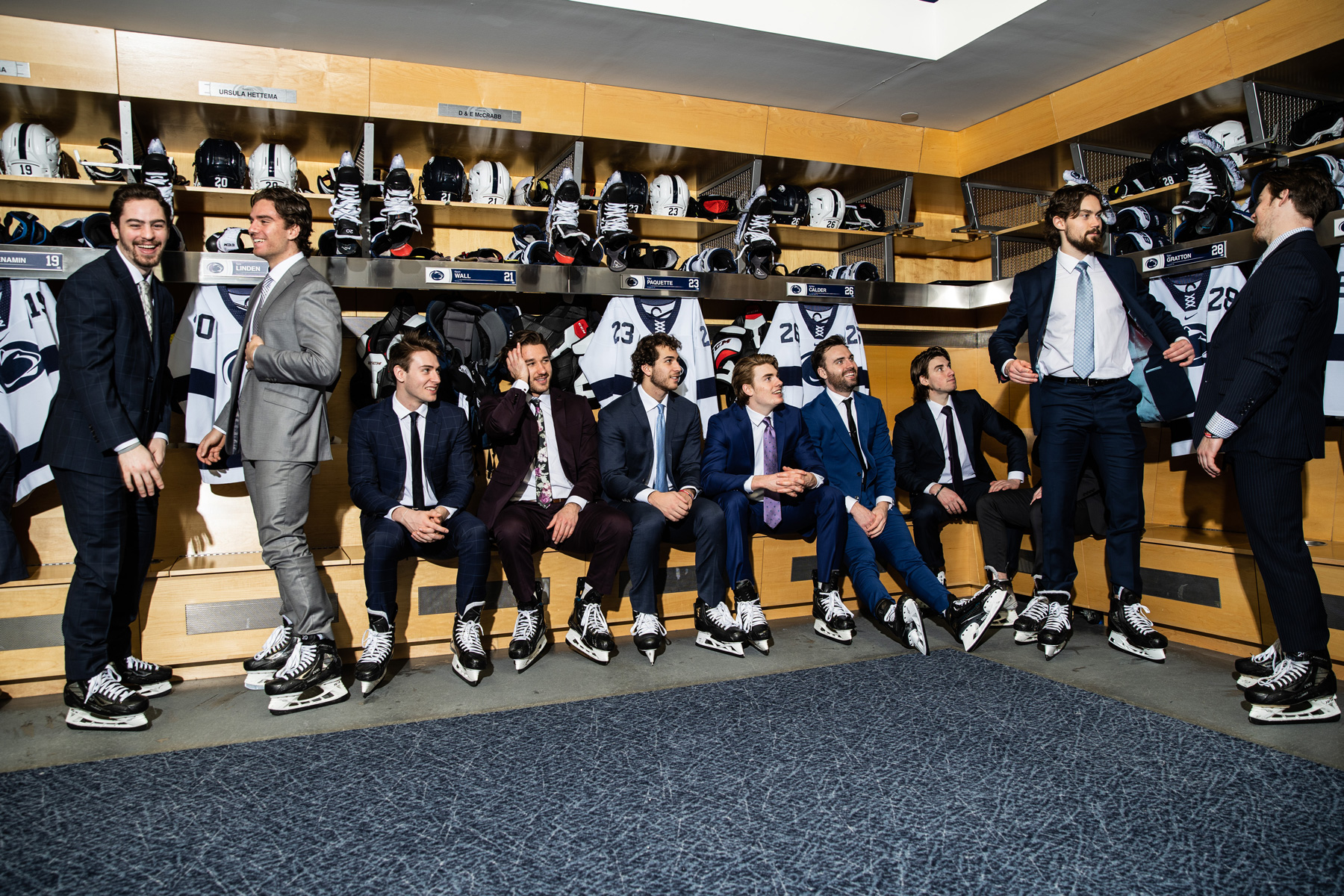
“I think they just do a great job of understanding what they need to do to be successful.”
Time management, Rager says, is paramount. “They know when they come in that, ‘hey, here’s the time that I need to commit to academics to be really successful; here’s the time I need to commit to hockey; here’s the time I need to commit socially,’” he says. “And they really do a great job with the time management piece and finding that balance that works for them overall, because everyone’s a little bit different. I think they just do a great job of understanding what they need to do to be successful.”
When Liam Souliere is successful on the ice, he is preventing opposing teams’ shots from going in the net as a junior goaltender from Brampton, Ontario, Canada. Seeing his father’s success as an entrepreneur, he chose Smeal’s finance major. “It just felt like the right place,” Souliere said about Penn State and Smeal.
From early October to the beginning of March, Souliere and his Penn State teammates took nine weekend road trips to compete. That can affect academic progress, but Souliere appreciates the cooperation from people within the finance major. “I’ve gotten pretty good at getting my homework out of the way before the weekend starts so that I don’t have to think about it, but I have to say that most teachers are pretty understanding when it comes to competition,” he says.
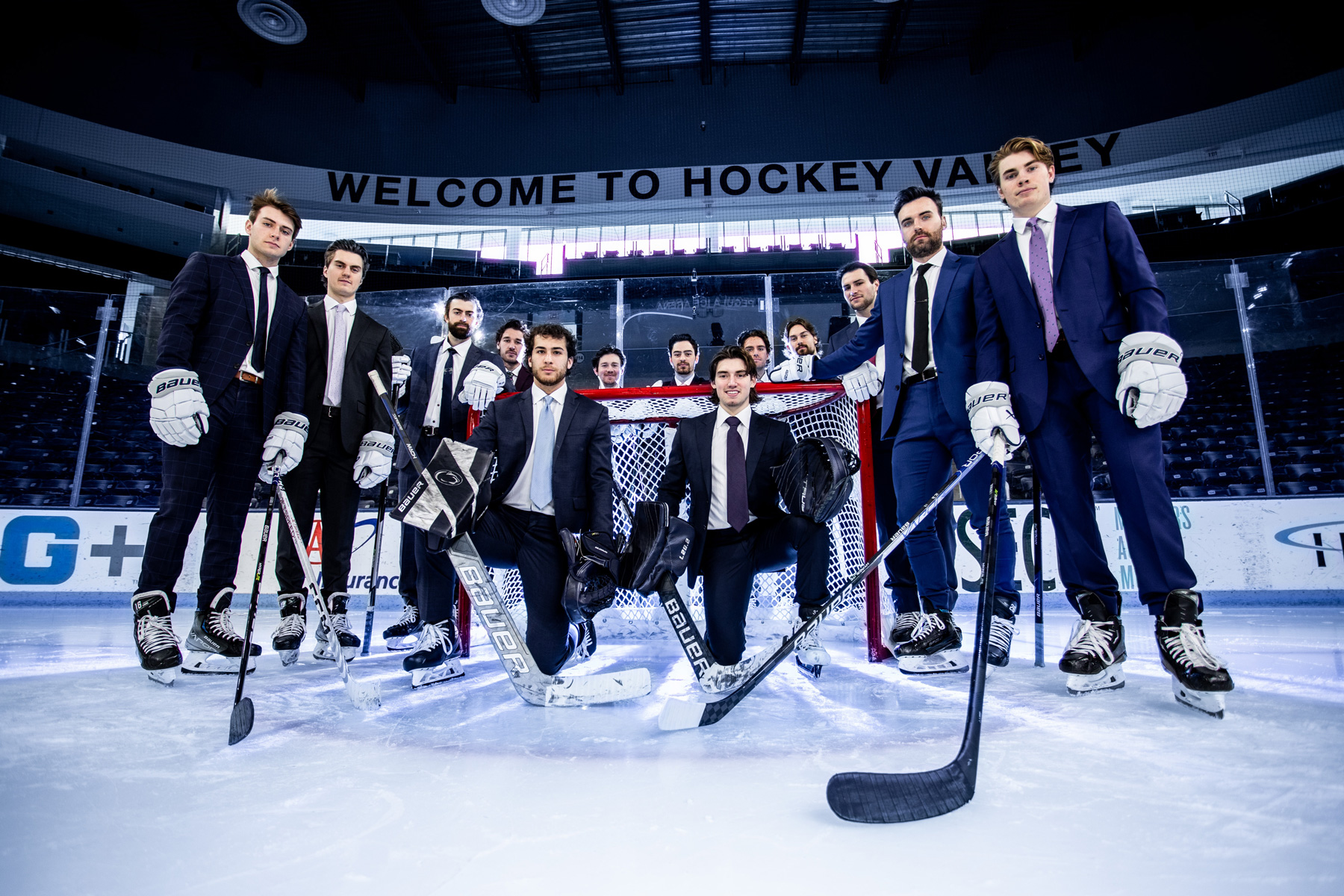
Smeal students who played on Penn State’s 2022-2023 Men’s Hockey Team are (from left, back row): Dylan Lugris, Dylan Gratton, Paul DeNaples, Xander Lamppa, Connor MacEachern, Connor McMenamin, Ture Linden, Tyler Gratton, Tyler Paquette, Ashton Calder, Christian Berger, (from left, front) Noah Grannan, and Liam
Souliere.
“Asking them for extra time if we need to finish the assignments whenever we’re on the road to go play some hockey, or if we have to miss classes on Friday because we’re traveling on Thursday. So, yeah, the professors have been awesome about it.”
Ture Linden is another player taking advantage of Smeal’s graduate degree offerings. From Great Falls, Virginia, Linden graduated magna cum laude in business and management from Rensselaer Polytechnic Institute in Troy, New York, and transferred to Penn State to use his fifth year of eligibility and pursue a graduate certificate in management consulting.
“It’s been awesome. I’m really impressed with the classes and professors I have,” he says. “My classes are graduate classes, so there’s a lot of group work. We’re doing real-world examples of different projects and kind of creating fake companies, which has been a lot of fun and something I hopefully get to do myself one day. Smeal’s definitely given me the legroom to do that.”
A senior forward, Connor MacEachern of Brooklin, Ontario, Canada, is part of the supply chain and information systems major, perennially one of the highest-ranking programs nationwide. While he wants to advance to the next level in hockey and signed an amateur tryout agreement with the American Hockey League’s San Jose Barracuda, he knows he has an excellent second option.
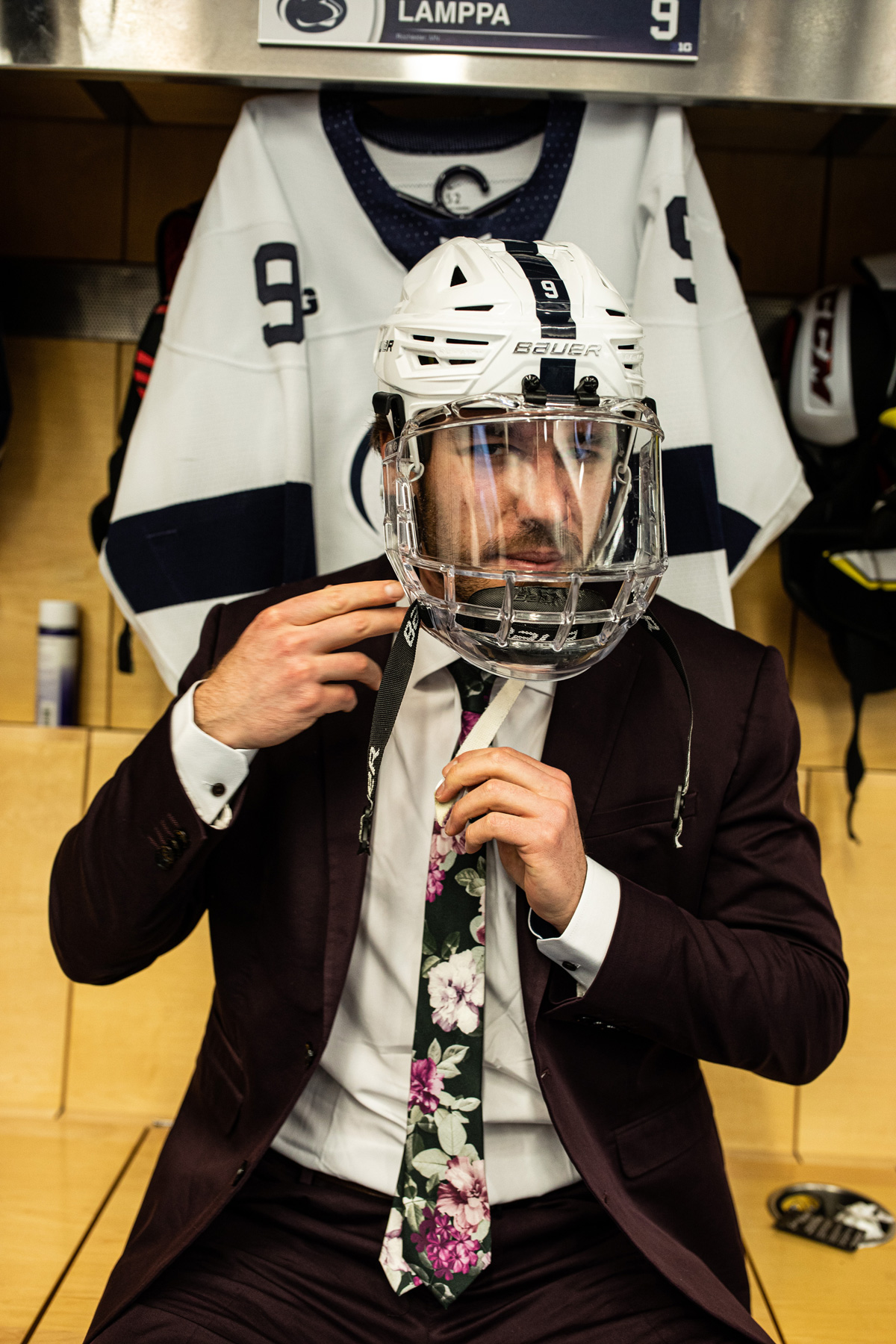
Xander Lamppa, a junior forward from Rochester, Minnesota, completed a Smeal degree in Corporate Innovation and Entrepreneurship.
“These guys are very, very driven, and very goal-oriented; they know what they want
to accomplish.”
“It’s definitely not easy by any means, but it’s certainly very fun,” MacEachern said. “With Smeal, I know it’s a very prestigious business school around the world and I’m very fortunate to have been able to be successful. I have two classes left, and just the support system within Smeal has been unbelievable.
“To be honest, I didn’t know much about (supply chain) when I first chose it. And that was one of the reasons I chose it because I wanted to learn more. I learned a different aspect that I wasn’t really familiar with, but now that I’m taking it, I love it; I find it very interesting.”
The team’s captain is Paul DeNaples, a defenseman from Moscow, Pennsylvania, near Wilkes-Barre. He’s a three-time Big Ten academic honoree who was an undergraduate in the College of Earth and Mineral Sciences prior to enrolling in Smeal’s real estate analysis and development master’s program. He jumped at the opportunity of a one-year master’s degree.
“When I was thinking about coming back for my fifth year, I was looking at all these one-year master’s programs because it’s pretty unique … not many places in the country offer them,” DeNaples says. “I knew I wanted to be in business, and I knew Smeal was the right place for me, but I didn’t know what degree. I was talking to some teammates, and they said to look into the real estate program. It’s been incredible so far.”
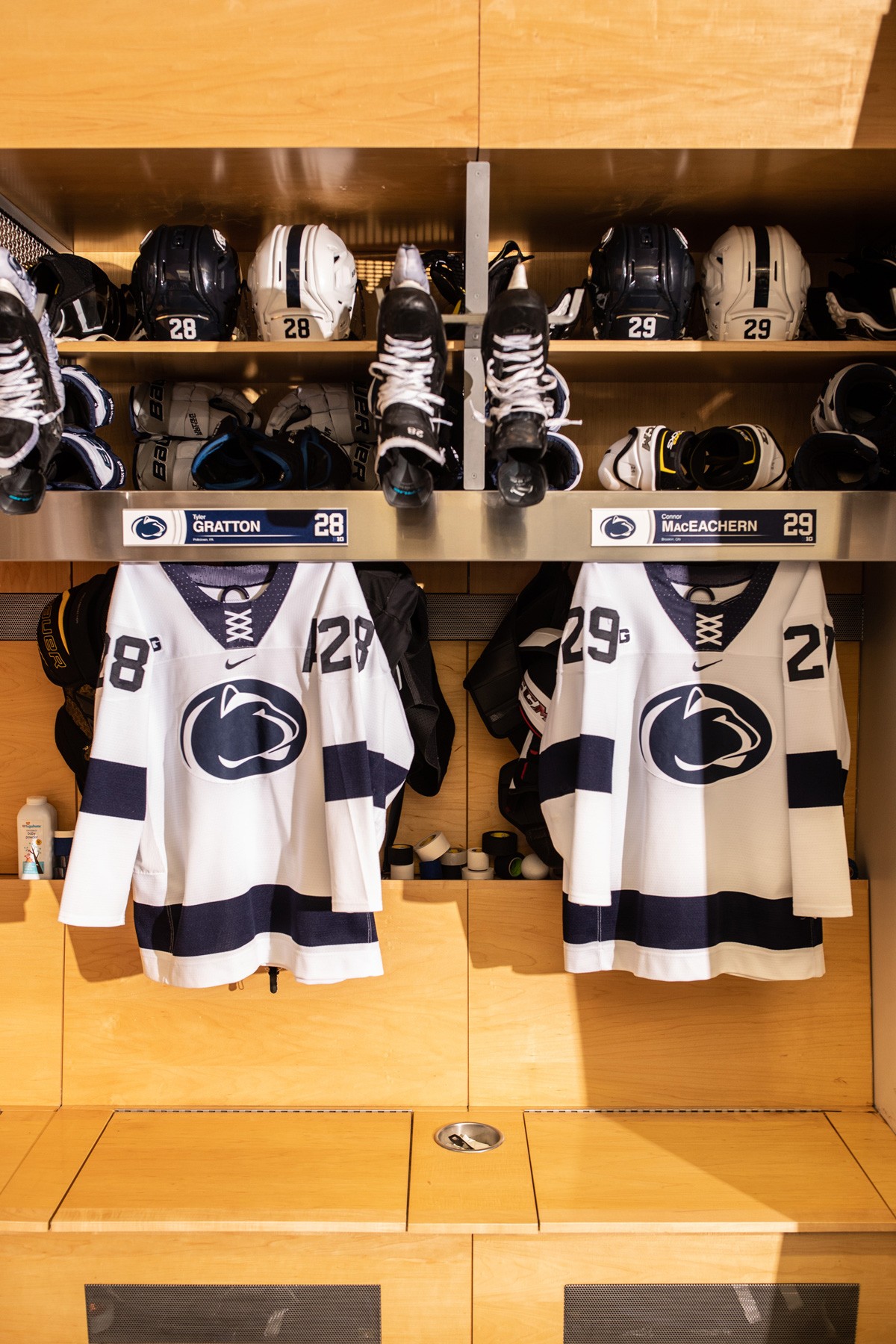
DeNaples says he prefers to get his schoolwork done before traveling, but, like other players, notes that the support system is superb. “Every single one of my teachers is just so understanding and they go the extra mile for me,” he says. “If I have to make up exams after missing classes, or get work from them, they record the lecture so I can watch and everything is catered to me which is incredible, and I’m so grateful.
“They’re willing to help me out and go the extra mile and it really means a lot that they take care of student-athletes.”
Rager is equally complimentary.
“These guys are very, very driven, and very goal-oriented; they know what they want to accomplish,” he says. “They come in here and say ‘hey, here’s my plan; here are the goals that I’ve set for myself, and here’s how I want to accomplish those goals.’ Those two areas to me set them apart and really allow for that success to occur.”
